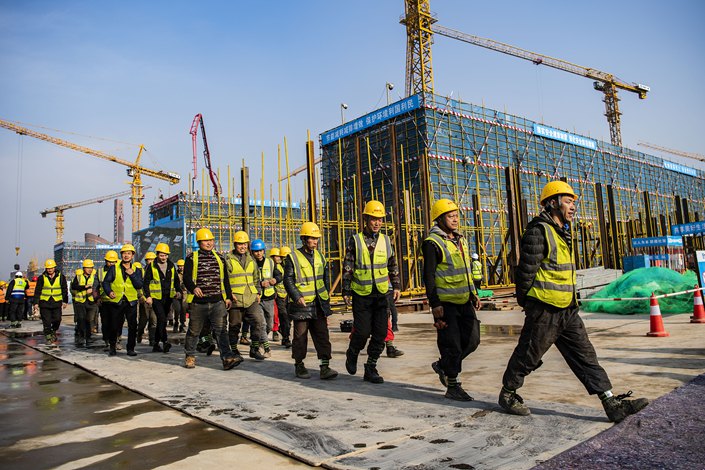Opinion: Seven Takeaways From the 2020 Central Economic Work Conference

Shen Jianguang is vice president and chief economist of JD Digits.
China’s annual Central Economic Work Conference laid out the country’s economic plan for 2021 and beyond. While reaffirming achievements made toward a robust recovery, it warned that “the economy is not on a firm footing yet” and “risks associated with the pandemic should not be ignored.”
Here are our key takeaways:
First, the commitment against a sharp reversal of accommodative policies
The conference called for the “continuity, stability and sustainability” of macro policies. Policies should be “targeted and effective,” while a policy U-turn is to be avoided. Proactive fiscal policy “should improve quality, efficiency and sustainability,” suggesting a mild retreat from the expansionary approach in 2020. Prudent monetary policy “should be flexible, targeted, reasonable and moderate,” and “keep macro leverage largely stable and strike a balance between economic recovery and risk prevention.”
Second, a shift from supply-side reform to demand-side management
The conference stressed that “while supply-side structural reform remains pivotal, attention must be paid to demand-side management,” reflecting an increasing focus on demand. Approaches will include creating jobs, improving social security, reforming income distribution, fostering the middle class, tapping into consumers in counties and smaller administrative regions, and increasing public spending by reasonable levels. The conference also mentioned the role of new infrastructure — data centers, internet of things, artificial intelligence, among others — and modern logistics in expanding effective investment.
Third, a reminder of lingering risk
Notably, the conference singled out four areas of risks in the aftermath of the domestic Covid-19 epidemic: local government debt, nonperforming bank loans that are set to rise in 2021, the debt evasion that was laid bare in the case of
Yongcheng Coal & Electricity Holding Group Co. Ltd., and rising macro leverage.
Fourth, vocal support for scientific and technological innovation
The words “science and technology” and “innovation” appear frequently in the press release. We expect heightened requirement of research and development during China’s new five-year plan period, particularly in regard to information technology, semiconductors, renewable energy, pharmaceuticals and health care.
Fifth, a call for strengthening anti-monopoly and regulation on financial innovation
Despite the undisputed importance of digital economy, the conference stressed that online platforms should comply with the law. “Laws and regulations must be amended to clarify the definition of monopoly by platform enterprises, manage data collection and utilization, and protect consumer rights,” according to the press release.
Sixth, an emphasis on resolving the megacity housing dilemma
While housing speculation has remained anathema, the conference brought up the issue of housing rentals in megacities as Danke Apartment and other similar rental platforms remained in crisis.
Seventh, a sustained drive for reform and opening up that creates opportunities for yuan internationalization
The conference emphasized the importance of “a higher level of openness to the outside world and the synergy between reform and opening up.” It mentioned state-owned enterprise reform, improving market access and financial governance, among others. In our opinion, in the context of the recent appreciation of the yuan, China should expand financial liberalization and deregulation, encourage enterprises to go global, and accelerate the two-way flow of capital, which will help maintain exchange rate stability and create opportunities to speed up yuan internationalization, so as to achieve a higher level of openness to the outside world.
The views and opinions expressed in this opinion section are those of the authors and do not necessarily reflect the editorial positions of Caixin Media.
If you would like to write an opinion for Caixin Global, please send your ideas or finished opinions to our email: opinionen@caixin.com
Support quality journalism in China. Subscribe to Caixin Global starting at $0.99.

Shen Jiangguang is vice president and chief economist of JD Digits, a digital and finance arm of Chinese e-commerce giant JD.com Inc.
- 1China Officials Dismiss Tax Hike Rumors After Tech Selloff
- 2Cover Story: How Gutter Oil Became a Prized Fuel for International Airlines
- 3Maersk Unit Takes Over CK Hutchison Panama Ports After Court Ruling
- 4Prominent Chinese Journalist Liu Hu Detained by Police in Chengdu
- 5China Provinces Set Cautious 2026 Growth Targets
- 1Power To The People: Pintec Serves A Booming Consumer Class
- 2Largest hotel group in Europe accepts UnionPay
- 3UnionPay mobile QuickPass debuts in Hong Kong
- 4UnionPay International launches premium catering privilege U Dining Collection
- 5UnionPay International’s U Plan has covered over 1600 stores overseas



